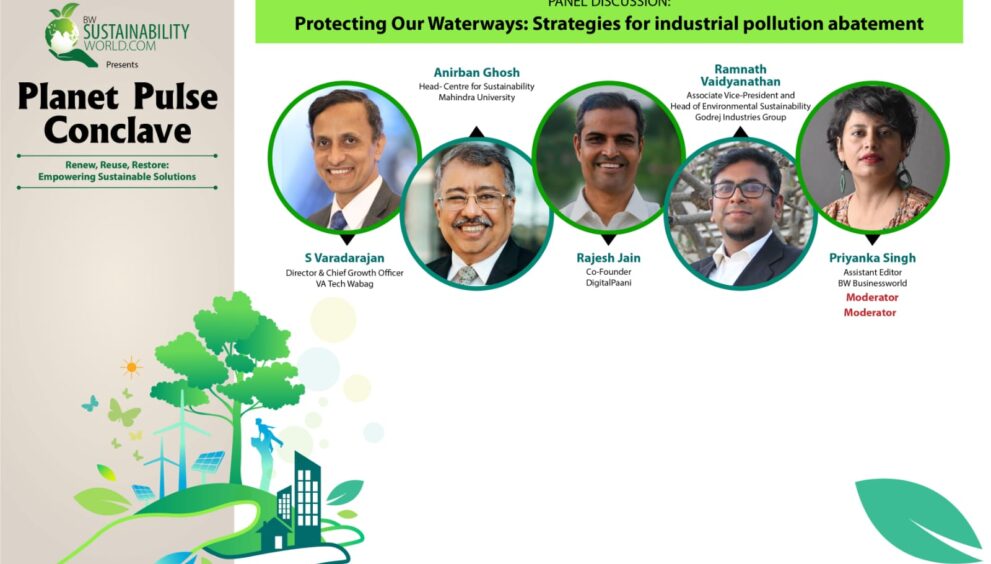Experts Call For Stricter Enforcement & Innovative Solutions To Combat Water Pollution

The biggest issue with water pollution in India is particularly on the industrial side when a lot of the unregulated industries, which are not the typical industrial zones often seed without all the right clearances
Industry leaders gathered to discuss pressing issues surrounding water pollution in India, highlighting the need for stronger enforcement of existing regulations and the adoption of innovative solutions to address the growing problem. The discourse revealed a consensus on the necessity for political willingness and a rethinking of water pricing to incentivise better technological adoption.
Emphasis on Existing Regulations and Need for Better Enforcement S. Varadarajan, Director & Chief Growth Officer at VA Tech Wabag, emphasised the importance of existing environmental regulations but pointed out the need for better enforcement.
“We already have some good regulations with us like the Environment Protection Act, Water (Prevention and Control of Pollution) Act, 1974, which established the Central Pollution Control Board (CPCB) and the State Pollution Control Board (SPCB). These boards are responsible for implementing these legislations and any industry before it starts functioning, has to get consent from these authorities to operate the plant,” he stated.
Varadarajan noted that while certification processes are in place, enforcement remains weak, partially due to insufficient political will. He suggested that technological solutions and increased awareness could help address affordability issues and minor risks. Challenges of Unregulated Industries and the Role of Water Pricing.
Ramnath Vaidyanathan, Associate Vice-President and Head of Environmental Sustainability at Godrej Industries Group argued that regulation often gets conflated with penalties and monitoring systems. He identified unregulated industries as a significant source of water pollution.
“One of the biggest issues with water pollution in India, particularly on the industrial side, is when a lot of the unregulated industries, which are not the typical industrial zones, often seed without all the right clearances, and then end up not tackling the problem,” Vaidyanathan explained.
He highlighted the artificially low price of water as a barrier to adopting advanced water treatment technologies, stressing the need for a reassessment of water pricing to make technological investments more viable.
Operational Difficulties in Regulated Industries
Rajesh Jain, Co-Founder of DigitalPaani, pointed out operational challenges within regulated industries. “Although there are regulations in place and there’s a lot of forward-looking work, which is happening on water credits, what we see is once the industry sets up their plants, they are finding it difficult to maintain because somehow there’s a lot of dependencies which come on the labour force and the locating expertise to these plants is probably not happening to an extent,” Jain said.
He noted that inefficiencies often arise due to distractions and responsibilities within corporate structures, leading to suboptimal plant operations despite good infrastructure and design.
Innovative Approaches and Future Prospects
Anirban Ghosh, Head of the Centre for Sustainability at Mahindra University, echoed concerns about unregulated industries while stressing the need for innovative approaches.”If you look at the regulations, which are both the approvals you have to take, the laws you have to follow, and whatever penalties there are post that, all these things have been in place, and yet we can see things are not working. So obviously we’ve got to try something different going forward,” Ghosh remarked.
He proposed a novel idea of connecting water sources directly to industrial discharge points to enforce accountability. Ghosh suggested that such a connection would drive innovation and compliance, making water projects more viable from a risk assessment perspective. The dialogue underscored the urgent need for enhanced regulatory enforcement, political commitment, and innovative solutions to effectively manage and mitigate water pollution in India.



















































































































































































































































































































































































































































































































































































































































































































































































































































